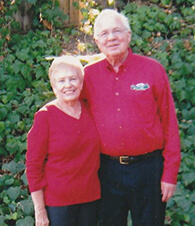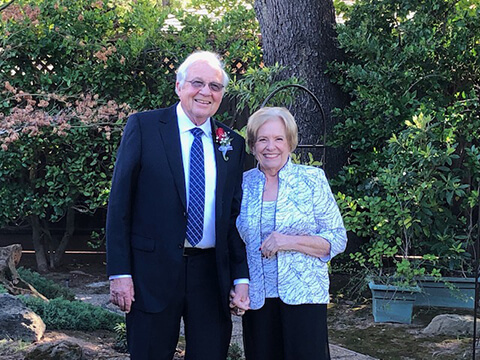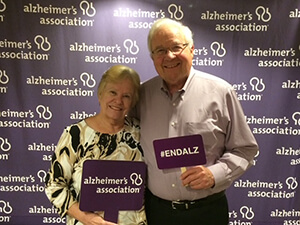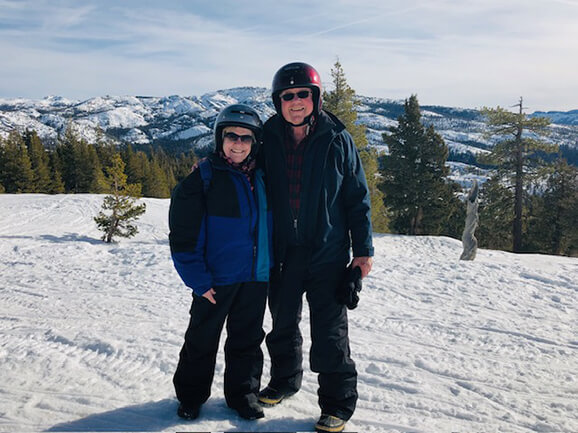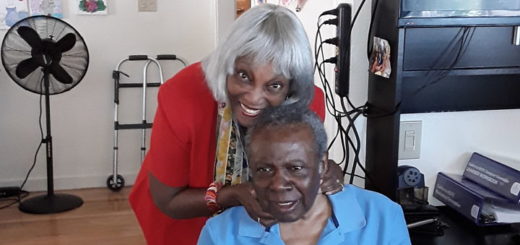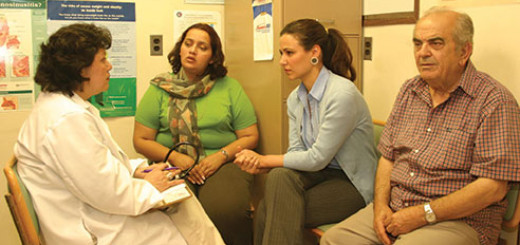Life after Alzheimer’s: One couple’s new lease on life
Betty MacDonald and Dave Morley were recently married in March of 2022. They have known each other since 2009 when they both joined an Alzheimer’s Association® support group. At the time both were married to other people both of whom had been diagnosed with Alzheimer’s.
Betty’s husband John had been diagnosed in 2005 and Dave’s wife Bonny had received her diagnosis on Christmas Eve in 2008. While both John and Bonny have died, Betty and Dave continue to live an exciting life full of understanding, love and adventure together.
Friendly lunches
Betty and Dave started off as friends occasionally going out to lunch together. However, on her way back from a trip to visit her son, Betty realized she might like Dave more than just a friend. “I went back to Massachusetts for a month to visit my son who lived there,” said Betty. “The week before I came home, I get an email from David saying, ‘I see by my calendar that you’re coming back this week. Would you like to have lunch with me?’ My heart skipped a beat. I said, ‘Oh Betty, there may be more to this relationship than just friends. I came back from my trip and we went out for lunch and we both realized there was more between us.”
The pair continued dating and traveling the world together including places like Africa. When Betty needed back surgery, she was told she would need someone around to help care for her while she healed. Dave suggested that Betty should move in with him. Dave said, “She had back surgery, moved in and never left. I took care of her.”
Getting married
It became clear that the couple wanted to be together forever. “I really hated the idea of introducing her as my ‘My partner Betty,’” said Dave. “I wanted to introduce [her] as ‘My wife.’”
After a few discussions, and Dave doing his best to convince Betty, the couple did the sensible thing and spoke with an attorney and an accountant. “There were legal and financial things we needed to have settled,” said Betty. “We want our assets from our previous lives to go to our children.”
Dave is part of a barbershop quartet. When the time came to propose, Dave invited his quartet friends over and together they sang some songs. Then Dave got down on one knee and asked Betty to marry him. Betty, of course, said yes.
“We got married in our back yard,” said Dave. “[Both of our families] came to our wedding, except our oldest grandson who was at college in Boston and couldn’t come out. We photoshopped him into the pictures.”
Volunteering for the Association
Now in their late 70s/early 80s the couple spends their time RVing across the country and volunteering for the Alzheimer’s Association. Last year their travels took them on a four-month drive to Alaska. This year, they’re planning to visit, Arizona, Mexico, Boston, Canada and down the entire East Coast. In the middle of all of that they plan to fly home to Saratoga to volunteer.
“We both feel strongly, we’ve been through some difficult times,” said Dave. “If we can help another caregiver, that’s wonderful. If someone calls us, we’re happy to meet them at Starbucks and have coffee for an hour.
“When we’re home and [the Association] has a class, we do it. We teach any of five classes. [For us] the hardest [class to teach is] Understanding & Responding to Dementia-Related Behaviors. We have to bring out some [emotional] things we put on the shelf, [because we use] our spouses as examples.
“[Our examples make it meaningful.] My wife went into [the disease] gently and once in a while she’d have issues. [Betty and I] have different examples because our experience was different,”
Betty adds, “[My husband] went into [the disease] kicking and screaming. He was aware and would talk about it. There were behavior issues both at home and when he was placed originally. I hope the audience will remember something we said. Maybe they can take that home and it’ll help them get through it.”
Getting support
As previously mentioned, Betty and Dave met in a support group, specifically an early-stage support group. This support group is unique as it is designed as two support groups that run concurrently. One for the person living with the disease and one for the care partner. Betty and Dave were in the care partner group, while their spouses, John and Bonny, were in the other.
Both Betty and Dave found the support group to be one of the best things they ever did as care partners. They were able to find a community of people who understood what they were going through. Not only that, but their spouses were able to share and express how they were feeling amongst people who were going through a similar process as them.
“For me, I was very resistant that this was happening,” said Betty. “I was angry and I had to work out those kind of issues. I listened and learned from others. I went to meetings and conferences and learned everything I could about the disease. I always encourage people to join. It saved our lives and I still have friends that I see now whose first husbands are also deceased.”
An unexpected death
It was during their time in the support group that the members of the group received some devastating news – one of their fellow care partners had died due to the stress of caring for her husband. “Everybody in the group noticed Judy wasn’t there and we asked the facilitator where she was,” said Dave. “She had died on the kitchen floor from stress. Her husband was a doctor, and he couldn’t figure out how to get out of his chair to give her CPR [chest compressions]. When I heard that, I thought, ‘I have to take care of myself. If I am not around, who will take care of my wife.’ It hit all of us hard.”
Alzheimer’s caregivers frequently report experiencing high levels of stress. It can be overwhelming to take care of a loved one with Alzheimer’s or other dementia, but too much stress can be harmful to both the caregiver and the person living with the disease.
According to the Alzheimer’s Association 2023 Alzheimer’s Disease Facts and Figures report, 74% of caregivers of people with Alzheimer’s or other dementias reported that they were “somewhat concerned” to “very concerned” about maintaining their own health since becoming a caregiver.
A recent study using data from the nationally representative Health and Retirement Study (HRS) showed that dementia caregivers who provided care to spouses were much more likely (41% increased odds) than other spousal caregivers of similar age to become increasingly frail during the time between becoming a caregiver and their spouses death.
Caregivers who perceived higher strain due to care responsibilities were at higher risk for death than caregivers who perceive little or no strain. The study also found that 18% of spousal caregivers die before their partners with dementia.
From that moment forward Dave made sure he prioritized his needs as well. “I listened more to the facilitator,” said Dave. “I focused as much on my needs as my wife’s needs. When I joined the group, I was hoping to learn how to take care of my wife. This taught me to also take care of myself.”
Starting their own group
Sadly, as the disease progressed for Bonny and John, they no longer qualified as early-stage and therefore could no longer attend the support group. This meant that Dave and Betty would also have to leave the group. Despite the Associations numerous caregiver support groups, Dave and Betty didn’t feel that those support groups were a good fit with them. Instead, they created their own.
“Dave was involved in church and was able to get a room,” said Betty. “As people started graduating out of the early-stage support group, we all started [coming to this group] every other week. We hired a social worker to come in once a month and lead the group. The other time it was just us 8-10 people in the group. We called it our ‘Graduate Group.’”
Dave adds, “It’s tough times and you can’t do it by yourself, you can’t. Some people try and you can’t do it. It’s too tough a disease to handle by yourself.”
Caring for others
As if caring for his first wife Bonny wasn’t enough, during his time in the support group, Dave became friends with Arthur, who was attending the support group alone. Arthur had been diagnosed with dementia prior to 2008 and didn’t have anyone to help support him.
“He needed a ride, so I offered to pick him up,” said Dave. “I knew he needed to get his taxes done so I asked him if he had done his taxes. He said, ‘I’m working on them.’ The second time, I asked again, ‘I’m working on them.’ The third week I asked, ‘Arthur, how are you doing on your taxes? Would you like me to come over and help?’ he said, ‘Oh would you please.’ I’m now his financial power of attorney. I’ve paid his bills all these years.”
Eventually, Dave and another member of the care partner support group came together to become Arthur’s financial and medical power of attorney. Because of this support, Arthur is still being cared for 16 years later.
This Valentine’s Day
This Valentine’s Day, Dave will spend the day with his barbershop quartet delivering singing valentines. Each valentine recipient receives a rose and two love songs. The quartet starts at 9 a.m. and will sing to 15 people or groups that day. Of course, one delivery will be to Betty. Dave says, “I’ve sung to Betty for seven years now and she knows it’s coming.” Betty replies, “It’s heartwarming and I get so nervous – it’s wonderful.”
March will mark the couple’s second wedding anniversary, but Dave says they will really be celebrating their 100th anniversary. “I was married for 56 years, Betty was married for 42. Together that’s 98. We’re celebrating our second anniversary which is really our 100th anniversary.”
The couple will spend the day in Mexico on a beach drinking margaritas. “We’re very grateful to have found each other, and respectful of previous spouses,” said Betty. “We love each other dearly. We got a new lease on life and there is life after Alzheimer’s.”
For more information on Alzheimer’s Association support groups visit alz.org/communityresource finder or call our 24/7 Helpline at 800.272.3900.





